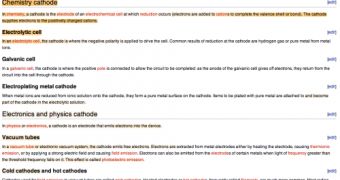Luca de Alfaro, a professor from the University of California, Santa Cruz, managed to build a special project that reveals the trustworthy articles published on Wikipedia. As you know, because Wikipedia is an open-source technology, everybody is able to edit the articles so some of them might provide inaccurate information. But how can you find which article is correct and which one is not? Using a special technology that marks the inaccurate lines from a Wikipedia article with an orange gradation. "Intermediate gradations of orange indicate intermediate trust values," the description of the product reads.
Have a look at the picture attached to the article. As you can see, several lines are colored with orange. This means that the information might be inaccurate while the default black text with white background means the details are not questionable. Obviously, the first thing that comes in your mind is: how does the technology manage to identify which line is trustworthy is which one is not? Well, the developer of the product sustains it is all related to the past edits of the users who posted the information.
"In order to compute text trust, we first compute the reputation of all Wikipedia authors at all points in time. Once the reputation values for all authors for all times are available, we compute the trust of each word of each revision," the official page of the product explains the procedure.
"We compute the trust value of each word of a revision according to the reputation of the original author of the word, as well as to the reputation of any authors that have edited the page, especially if the edit is in the proximity of the word. We are still fine-tuning the algorithms, which will be described in a forthcoming publication."
According to The Associated Press, the developer of this project aims to see his product bundled in Wikipedia and available through the official page of the web-based encyclopedia. "I don't want to give the impression that Wikipedia is low-trust. It really works very well. What I wanted to make sure is that nobody can single-handedly modify information without some trace of that being available for some time afterwards," Luca de Alfaro said for AP.

 14 DAY TRIAL //
14 DAY TRIAL //